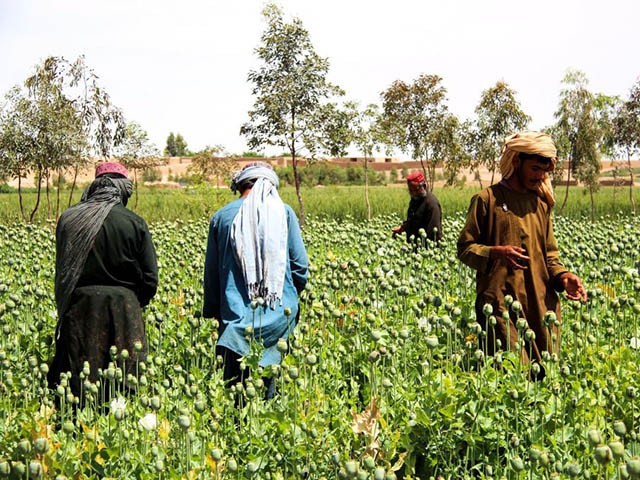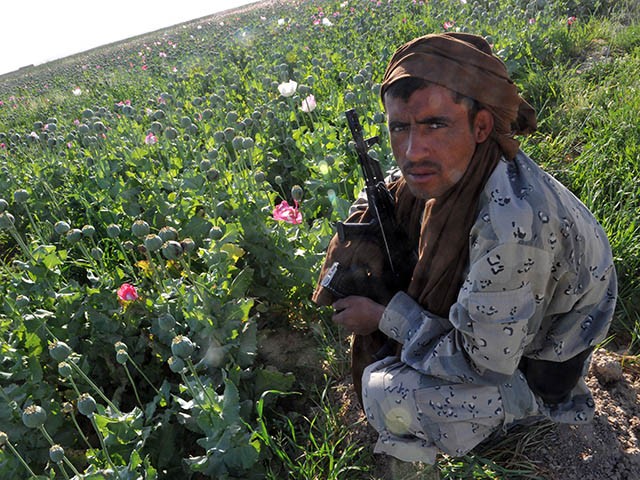The Taliban terror group on Tuesday claimed Afghanistan “will no longer be a hub for poppy cultivation or for the drug business” now that the jihadist group has gained control of the country, Afghanistan’s Tolo News reported Tuesday.
“From now on, Afghanistan will be a narcotics-free country,” Taliban spokesman Zabiullah Mujahid claimed on August 17. Mujahid made the pronouncement while answering questions from international journalists at the Taliban’s first press conference since seizing Kabul from its U.S.-backed government on August 15.
“We are assuring our countrymen and women and the international community that Afghanistan will not produce any kind of narcotics,” Mujahid said at Tuesday’s press briefing in Kabul, as quoted by Pakistan’s Geo News.
He then asked the world for money to keep that promise.
“Afghanistan … needs international assistance. International communities should help us so that we can have alternative crops. If we can provide the people with alternative crops then, of course, very soon we can bring [the narcotics industry] to an end,” he added.
Afghanistan remains the world’s top supplier of illicit opiates, according to a Reuters report published August 16. The news agency cited data from the U.N. Office of Drugs and Crime (UNODC), which found that Afghanistan’s opiate production accounts for “more than 80 percent of global morphine and heroin” seized by law enforcement officials annually.
Thousands of Afghan farmers have grown poppy flowers for their natural supply of crude opium sap since at least the 1950s. Processors convert this extracted sap into opioids, such as heroin and morphine, for sale on the illicit drug market.

In this photograph taken on April 13, 2019, Afghan farmers harvest opium sap from a poppy field in the Gereshk district of Helmand province. – Afghanistan is the world’s top grower of opium, and the crop accounts for hundreds of thousands of jobs. (Photo by NOOR MOHAMMAD / AFP) (Photo credit should read NOOR MOHAMMAD/AFP via Getty Images)
“The total area under opium poppy cultivation in Afghanistan was approximately 224,000 hectares in 2020, which is an increase of 37 percent or 61,000 hectares when compared to 2019,” the UNODC revealed in its 2020 Afghanistan Opium Survey, published in May.
“At 224,000 hectares, the area under cultivation was one of the highest ever measured,” according to the survey, which the UNODC produced jointly with Afghanistan’s National Statistics and Information Authority (NSIA).
“The estimated all-time high for opium production was set in 2017 at 9,900 tons worth some $1.4 billion in sales by farmers or roughly 7 percent of Afghanistan’s GDP,” the UNODC reported.
“The Taliban have counted on the Afghan opium trade as one of their main sources of income,” Cesar Gudes, the head of UNODC’s Kabul office, told Reuters on August 16. Gudes warned that the Taliban’s vow on Tuesday to eradicate Afghanistan’s poppy and narcotics industry was likely an empty promise, as the jihadist group has traditionally profited from the country’s drug trade.
“[T]hese are the best moments in which these illicit groups tend to position themselves [to expand their business],” Gudes said, referring to the mounting chaos in Kabul as the Taliban work to eradicate all traces of the capital’s U.S.-backed government, which has now largely fled the country.
Afghanistan policemen destroy poppy field in Alishing district in Laghman province on April 16, 2012. AFP PHOTO/ WASEEM NIKZAD (Photo credit should read WASEEM NIKZAD/AFP via Getty Images)
Afghanistan’s illegal opium trade was worth up to $6.6 billion in 2017, according to the U.N. The Taliban earns roughly “$40 million annually from this lucrative industry predominantly from levies on opium production, heroin labs and drug shipments,” David Mansfield, a leading researcher of Afghanistan’s illicit opiate production, told Reuters on August 16.
The jihadists have encouraged Afghan farmers to plant poppies illegally over the past two decades while Afghanistan was ruled by a U.S.-backed government in Kabul, which officially prohibited the practice. The Taliban offered poppy farmers protection from government authorities who tried, unsuccessfully, to halt poppy production in Afghanistan. The group then charged farmers taxes on poppy crops and used the funds to finance their operations.
